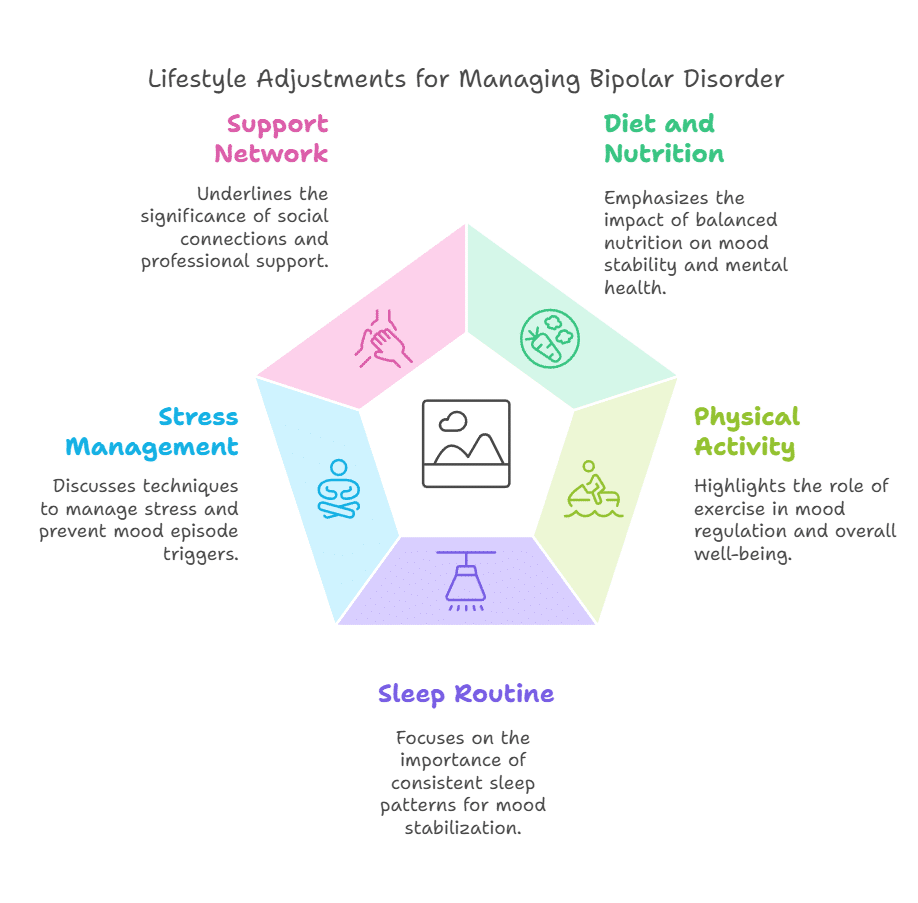Managing bipolar disorder involves more than medication and therapy. Lifestyle adjustments can play a crucial role in stabilizing mood, reducing the frequency and intensity of episodes, and improving overall well-being. By focusing on healthy habits and supportive environments, individuals with bipolar disorder can take active steps toward a balanced and fulfilling life.
The Role of Diet and Nutrition
1. The Connection Between Diet and Mental Health:
What we eat has a profound impact on brain function and mood regulation. Nutritional imbalances can exacerbate symptoms of bipolar disorder, while a balanced diet can provide the foundation for improved mental health.
2. Essential Nutritional Components:
- Omega-3 Fatty Acids: Found in fish, flaxseeds, and walnuts, omega-3s are known to reduce inflammation and improve mood stability. Research suggests they may decrease the severity and frequency of depressive episodes in bipolar disorder.
- Complex Carbohydrates: Whole grains, legumes, and vegetables help maintain steady blood sugar levels, reducing mood swings and energy crashes.
- Antioxidants: Foods rich in antioxidants, like berries and leafy greens, combat oxidative stress, which is linked to mood disorders.
- Hydration: Staying well-hydrated is essential for brain function and mood regulation.
3. Foods to Avoid:
- Processed sugars and caffeine can trigger energy spikes and crashes, potentially aggravating manic or depressive symptoms.
- Alcohol and recreational drugs should be avoided as they can destabilize mood and interact negatively with medications.

Benefits of Regular Physical Activity
1. Exercise and Mood Stabilization:
Physical activity is a powerful tool for managing bipolar disorder. It helps regulate mood by boosting the production of endorphins, often referred to as “feel-good” hormones.
2. Types of Beneficial Exercise:
- Aerobic Activities: Running, cycling, and swimming are effective for reducing stress and improving overall mood.
- Strength Training: Building muscle through weightlifting or resistance exercises enhances physical health, which in turn supports mental well-being.
- Mind-Body Practices: Yoga and tai chi combine physical movement with mindfulness, promoting relaxation and emotional regulation.
3. How Exercise Helps:
- Reduces symptoms of anxiety and depression.
- Improves sleep patterns, which are critical for mood stabilization.
- Enhances energy levels and cognitive function, counteracting fatigue often associated with depressive episodes.
4. Starting Small:
For individuals with low energy during depressive phases, even small amounts of activity, like a short walk or gentle stretching, can make a difference.
Establishing a Sleep Routine
1. The Importance of Sleep in Bipolar Disorder:
Sleep disruption is both a symptom and trigger of mood episodes in bipolar disorder. Manic phases often involve reduced sleep, while depressive episodes may lead to hypersomnia. A consistent sleep routine can help mitigate these extremes.
2. Tips for Healthy Sleep Hygiene:
- Set a Consistent Schedule: Go to bed and wake up at the same time every day, even on weekends.
- Create a Restful Environment: Keep the bedroom dark, quiet, and cool to promote better sleep.
- Limit Screen Time: Avoid electronics at least an hour before bed to reduce exposure to blue light, which can interfere with melatonin production.
- Relaxation Techniques: Practices like progressive muscle relaxation, deep breathing, or meditation before bed can help calm the mind.
3. Recognizing Triggers:
Understanding personal sleep triggers, such as stress or irregular work schedules, allows individuals to take proactive steps to protect their sleep patterns.
Stress Management Techniques
1. The Link Between Stress and Bipolar Disorder:
Stress is a common trigger for both manic and depressive episodes. Developing effective stress management strategies can help individuals maintain emotional stability.
2. Techniques for Managing Stress:
- Mindfulness and Meditation: These practices encourage staying present, reducing anxiety and emotional reactivity. Apps like Headspace or Calm can be helpful tools.
- Structured Daily Routine: A predictable schedule provides a sense of stability and reduces decision fatigue, which can heighten stress.
- Breathing Exercises: Techniques like diaphragmatic breathing can quickly lower stress levels during overwhelming moments.
- Time Management: Breaking tasks into manageable steps and setting realistic goals can prevent feelings of being overwhelmed.
3. Physical Stress Relievers:
Regular massages, warm baths, or spending time in nature can provide physical relaxation and emotional relief.
Building a Support Network
1. The Importance of Connection:
Strong social support is essential for managing bipolar disorder. Support networks offer emotional encouragement, practical assistance, and a sense of belonging.
2. Key Components of a Support Network:
- Family and Friends: Educating loved ones about bipolar disorder helps them understand the condition and provide meaningful support.
- Therapists and Psychiatrists: Regular therapy sessions and check-ins with mental health professionals ensure continuous and effective treatment.
- Support Groups: Joining a local or online bipolar disorder support group connects individuals with others facing similar challenges, providing a platform for sharing experiences and coping strategies.
3. Communicating Needs:
Being open about personal challenges and specific needs helps build stronger, more understanding relationships within a support network.
4. Technology and Support:
Online forums, apps, and social media groups offer additional ways to find community and stay connected, especially during depressive episodes when reaching out in person might feel overwhelming. Accessing these communities complements more structured support systems and resources for individuals with bipolar disorder, which include peer groups, clinical networks, and digital tools.
Lifestyle adjustments are a vital component of managing bipolar disorder. From prioritizing balanced nutrition and regular exercise to establishing consistent sleep routines and stress management strategies, these habits create a solid foundation for stability. Equally important is building a supportive network of friends, family, and professionals who can provide guidance and encouragement.
While bipolar disorder presents unique challenges, adopting these lifestyle changes can empower individuals to take control of their mental health and improve their overall quality of life. When combined with medical treatments and therapy, these adjustments pave the way for a more balanced and fulfilling future.





